- Home
- Jack London
Hearts of Three Page 9
Hearts of Three Read online
Page 9
“Fill away and get out of this, skipper!” Henry broke in angrily.
“Sir, assuring you of your gratification of pardon, it is my unpleasant task to inform you of two things. Neither are you my charterer; nor are you the noble King George to whom I give ambitious allegiance.”
“Well, I’m your charterer, skipper,” Francis said pleasantly, for he had learned to humor the man of mixed words and parentage. “So just kindly put up your helm and sail us out of this Chiriqui Lagoon as fast as God and this failing wind will let you.”
“It is not in the charter, sir, that my Angelique shall break the laws of Panama and King George.”
“I’ll pay you well,” Francis retorted, beginning to lose his temper. “Get busy.”
“You will then recharter, sir, at three times the present charter?”
Francis nodded shortly.
“Then wait, sir, I entreat. I must procure pen and paper from the cabin and make out the document.”
“Oh, Lord,” Francis groaned. “Square away and get a move on first. We can make out the paper just as easily while we are running as standing still. Look! They are beginning to fire.”
The half-breed captain heard the report, and, searching his spread canvas, discovered the hole of the bullet high up near the peak of the mainsail.
“Very well, sir,” he conceded. “You are a gentleman and an honorable man. I trust you to affix your signature to the document at your early convenience Hey, you nigger! Put up your wheel! Hard up! Jump, you black rascals, and slack away mainsheetf Take a hand there, you, Percival, on the boom-tackle!”
All obeyed, as did Percival, a grinning shambling Kingston negro who was as black as his name was white, and as did another, addressed more respectfully as Juan, who was more Spanish and Indian than negro, as his light yellow skin attested, and whose fingers, slacking the foresheet, were as slim and delicate as a girl’s.
“Knock the nigger on the head if he keeps up this freshness,” Henry growled in an undertone to Francis. “For two cents I’ll do it right now.”
But Francis shook his head.
“He’s all right, but he’s a Jamaica nigger, and you know what they are. And he’s Indian as well. We might as well humor him, since it’s the nature of the beast. He means all right, but he wants the money, he’s risking his schooner against confiscation, and he’s afflicted with vocabularitis. He just must get those long words out of his system or else bust.”
Here Enrico Solano, with quivering nostrils and fingers restless on his rifle as with half an eye he kept track of the wild shots being fired from the beach, approached Henry and held out his hand.
“I have been guilty of a grave mistake, Senor Morgan,” he said. “In the first hurt of my affliction at the death of my beloved brother, Alfaro, I was guilty of thinking you guilty of his murder.” Here old Enrico’s eyes flashed with anger consuming but unconsumable. “For murder it was, dastardly and cowardly, a thrust in the dark in the back. I should have known better. But I was overwhelmed, and the evidence was all against you. I did not take pause of thought to consider that my dearly beloved and only daughter was betrothed to you; to remember that all I had known of you was straightness and man-likeness and courage such as never stabs from behind the shield of the dark. I regret. I am sorry. And I am proud once again to welcome you into my family as the husband-to-be of my Leoncia.”
And while this wholehearted restoration of Henry Morgan into the Solano family went on, Leoncia was irritated because her father, in Latin��� American fashion, must use so many fine words and phrases, when a single phrase, a handgrip, and a square look in the eyes were all that was called for and was certainly all that either Henry or Francis would have vouchsafed had the situation been reversed. Why, why, she asked of herself, must her Spanish stock, in such extravagance of diction, seem to emulate the similar extravagance of the Jamaica negro?
While this reiteration of the betrothal of Henry and Leoncia was taking place, Francis, striving to appear uninterested, could not help taking note of the pale-yellow sailor called Juan, conferring for’ard with others of the crew, shrugging his shoulders significantly, gesticulating passionately with his hands.
CHAPTER VII
“AND now we’ve lost both the Gringo pigs,” Alvarez Torres lamented on the beach as, with a slight freshening of the breeze and with booms winged out to port and starboard, the Ang clique passed out of range of their rifles.
“Almost would I give three bells to the cathedral,” Mariano Vercara e Hijos proclaimed, “to have them within a hundred yards of this rifle. And if I had will of all Gringos they would depart so fast that the devil in hell would be compelled to study English.”
Alvarez Torres beat the saddle pommel with his hand in sheer impotence of rage and disappointment.
“The Queen of my Dreams!” he almost wept. “She is gone and away, of! with the two Morgans. I saw her climb up the side of the schooner. And there is the New York Regan. Once out of Chiriqui Lagoon, the schooner may sail directly to New York. And the Francis pig will not have been delayed a month, and the Senor Regan will remit no money.”
“They will not get out of Chiriqui Lagoon,” the Jefe said solemnly. “I am no animal without reason. I am a man. I know they will not get out. Have I not sworn eternal vengeance? The sun is setting, and the promise is for a night of little wind. The sky tells it to one with half an eye. Behold those trailing wisps of clouds. What wind may be, and little enough of that, will come from the north-east. It will be a head beat to the Chorrera Passage. They will not attempt it. That nigger captain knows the lagoon like a book. He will try to make the long tack and go out past Bocas del Toro, or through the Cartago Passage. Even so, we will outwit him. I have brains, reason. Reason. Listen. It is a long ride. We will make it straight down the coast to Las Palmas. Captain Rosaro is there with the Dolores-”
“The second-hand old tugboat? that cannot get out of her own way?” Torres queried.
“But this night of calm and morrow of calm she will capture the Angelique,” the Jefe replied. “On, comrades! We will ride! Captain Rosaro is my friend. Any favor is but mine to ask.”
At daylight, the worn-out men, on beaten horses, straggled through the decaying village of Las Palmas and down to the decaying pier, where a very decayed-looking tugboat, sadly in need of paint, welcomed their eyes. Smoke rising from the stack advertised that steam was up, and the Jefe was wearily elated.
“A happy morning, Senor Capitan Rosaro, and well met,” he greeted the hard-bitten Spanish skipper, who was reclined on a coil of rope and who sipped black coffee from a mug that rattled against his teeth.
“It would be a happier morning if the cursed fever had not laid its chill upon me,” Captain Rosaro grunted sourly, “the hand that held the mug, the arm, and all his body shivering so violently as to spill the hot liquid down his chin and into the black-and-gray thatch of hair that covered his half-exposed chest. “Take that, you animal of hell!” he cried, flinging mug and contents at a splinter of a half-breed boy, evidently his servant, who had been unable to repress his glee.
But the sun will rise and the fever will work its will and shortly depart,” said the Jefe, politely ignoring the display of spleen. “And you are finished here, and you are bound for Bocas del Toro, and we shall go with you, all of us, on a rare adventure. We will pick up the schooner Angelique, calm-bound all last night in the lagoon, and I shall make many arrests, and all Panama will so ring with your courage and ability, Capitan, that you will forget that the fever ever whispered in you.”
“How much?” Capitan Rosaro demanded bluntly.
Much?” the Jefe countered in surprise. “This is an affair of government, good friend. And it is right on your way to Bocas del Toro. It will not cost you an extra shovelful of coal.”
“Muchacho! More coffee!” the tug-skipper roared at the boy.
A pause fell, wherein Torres and the Jefe and all the draggled following yearned for the piping hot coffee brought by t
he boy. Captain Rosaro played the rim of the mug against his teeth like a rattling of castanets, but managed to sip without spilling and so to burn his mouth.
A vacant-faced Swede, in filthy overalls, with a soiled cap on which appeared “Engineer,” came up from below, lighted a pipe, and seemingly went into a trance as he sat on the tug’s low rail.
“How much?” Captain Eosaro repeated.
“Let us get under way, dear friend,” said the Jefe. “And then, when the fever-shock has departed, we will discuss the matter with reason, being reasonable creatures ourselves and not animals.”
“How much?” Captain Eosaro repeated again. “I am never an animal. I always am a creature of reason, whether the sun is up or not up, or whether this thrice-accursed fever is upon me. How much?”
“Well, let us start, and for how much?” the Jefe conceded wearily.
“Fifty dollars gold,” was the prompt answer.
“You are starting anyway, are you not, Capitan?” Torres queried softly.
“Fifty gold, as I have said.”
The Jefe Politico threw up his hands with a hopeless gesture and turned on his heel to depart.
“Yet you swore eternal vengeance for the crime committed, on your jail,” Torres reminded him.
“But not if it costs fifty dollars,” the Jefe snapped back, out of the corner of his eye watching the shivering captain for some sign of relenting.
“Fifty gold,” said the Captain, as he finished draining the mug and with shaking fingers strove to roll a cigarette. He nodded his head in the direction of the Swede, and added, “and five gold extra for my engineer. It is our custom.”
Torres stepped closer to the Jefe and whispered:
“I will pay for the tug myself and charge the Gringo Regan a hundred, and you and I will divide the difference. We lose nothing. We shall make. For this Regan pig instructed me well not to mind expense.”
As the sun slipped brazenly above the eastern horizon, one gendarme went back into Las Palmas with the jaded horses, the rest of the party descended to the deck of the tug, the Swede dived down into the engine-room, and Captain Eosaro, shaking off his chill in the sun’s beneficent rays, ordered the deck-hands to cast off the lines, and put one of them at the wheel in the pilot-house.
And the same day-dawn found the Ang clique, after a night of almost perfect calm, off the mainland from which she had failed to get away, although she had made sufficient northing to be midway between San Antonio and the passages of Bocas del Toro and Cartago. These two passages to the open sea still lay twenty-five miles away, and the schooner truly slept on the mirror surface of the placid lagoon. Too stuffy below for sleep in the steaming tropics, the deck was littered with the sleepers. ��� On top the small house of the cabin, in solitary state, lay Leoncia. On the narrow runways of deck on either side lay her brothers and her father. Aft, between the cabin companionway and the wheel, side by side, Francis’ arm across Henry’s shoulder, as if still protecting him, were the two Morgans. On one side the wheel, sitting, with arms on knees and head on arms, the negro-Indian skipper slept, and just as precisely postured, on the other side of the wheel, slept the helmsman, who was none other than Percival, the black Kingston negro. The waist of the schooner was strewn with the bodies of the mixed-breed seamen, while for’ard, on the tiny forecastlehead, prone, his face buried upon his folded arms, slept the lookout.
Leoncia, in her high place on the cabin-top, awoke first. Propping her head on her hand, the elbow resting on a bit of the poncho on which she lay, she looked down past one side of the hood of the companionway upon the two young men. She yearned over them, who were so alike, and knew love for both of them, remembered the kisses of Henry on her mouth, thrilled till the blush of her own thoughts mantled her cheek at memory of the kisses of Francis, and was puzzled and amazed that she should have it in her to love two men at the one time. As she had already learned of herself, she would follow Henry to the end of the world and Francis even farther. And she could not understand such wantonness of inclination.
Fleeing from her own thoughts, which frightened her, she stretched out her arm and dangled the end of her silken scarf to a tickling of Francis’ nose, who, after restless movements, still in the heaviness of sleep, struck with his hand at what he must have thought to be a mosquito or a fly, and hit Henry on the chest. So it was Henry who was first awakened. He sat up with such abruptness as to awaken Francis.
“Good morning, merry kinsman,” Francis greeted. “Why such violence?”
“Morning, morning, and the morning’s morning, comrade,” Henry muttered. “Such was the violence of your sleep that it was you who awakened me with a buffet on my breast. I thought it was the hangman, for this is the morning they planned to kink my neck.” He yawned, stretched his arms, gazed out over the rail at the sleeping sea, and nudged Francis to observance of the sleeping skipper and helmsman.
They looked so bonny, the pair of Morgans, Leoncia thought; and at the same time wondered why the English word had arisen unsummoned in her mind rather than a Spanish equivalent. Was it because her heart went out so generously to the two Gringos that she must needs think of them in their language instead of her own?
To escape the perplexity of her thoughts, she dangled the scarf again, was discovered, and laughingly confessed that it was she who had caused their violence of waking.
Three hours later, breakfast of coffee and fruit over, she found herself at the wheel taking her first lesson of steering and of the compass under Francis’ tuition. The Any clique, under a crisp little breeze which had hauled around well to north ‘ard, was for the moment heeling it through the water at a six ��� knot clip. Henry, swaying on the weather side of the after-deck and searching the sea through the binoculars, was striving to be all unconcerned at the lesson, although secretly he was mutinous with himself for not having first thought of himself introducing her to the binnacle and the wheel. Yet he resolutely refrained from looking around or from even stealing a corner-of-the-eye glance at the other two.
But Captain Trefethen, with the keen cruelty of Indian curiosity and the impudence of a negro subject of King George, knew no such delicacy. He stared openly and missed nothing of the chemic drawing together of his charterer and the pretty Spanish girl. When they leaned over the wheel to look into the binnacle, they leaned toward each other and Leoncia’s hair touched Francis’ cheek. And the three of them, themselves and the breed skipper, knew the thrill induced by such contact. But the man and woman knew immediately what the breed skipper did not know, and what they knew was embarrassment. Their eyes lifted to each other in a flash of mutual startlement, and drooped away and down guiltily. Francis talked very fast and loud enough for half the schooner to hear, as he explained the lubber’s point of the compass. But Captain Trefethen grinned.
A rising puff of breeze made Francis put the wheel up. His hand to the spoke rested on her hand already upon it. Again they thrilled, and again the skipper grinned.
Leoncia’s eyes lifted to Francis’, then dropped in confusion. She slipped her hand out from under and terminated the lesson by walking slowly away with a fine assumption of casualness, as if the wheel and the binnacle no longer interested her. But she had left Francis afire with what he knew was lawlessness and treason as he glanced at Henry’s shoulder and profile and hoped he had not seen what had occurred. Leoncia, apparently gazing off across the lagoon to the jungle-clad shore, was seeing nothing as she thoughtfully turned her engagement ring around and around on her finger.
But Henry, turning to tell them of the smudge of smoke he had discovered on the horizon, had inadvertently seen. And the negro-Indian captain had seen him see. So the captain lurched close to him, the cruelty of the Indian dictating the impudence of the negro, as he said in a low voice:
“Ah, be not downcast, sir. The senorita is generously hearted. There is room for both you gallant gentlemen in her heart.”
And the next fraction of a second he learned the inevitable and invari
able lesson that white men must have their privacy of intimate things; for he lay on his back, the back of his head sore from contact with the deck, the front of his head, between the eyes, sore from contact with the knuckles of Henry Morgan’s right hand.
But the Indian in the skipper was up and raging as he sprang to his feet, knife in hand. Juan, the pale-yellow mixed breed, leaped to the side of his skipper flourishing another kniie, while several of the nearer sailors joined in forming a s^mi-circle of attack on Henry, who, with a quick step back and an upward slap of his hand, under the pin-rail, caused an iron belaying pin to leap out and up into the air. Catching it m mid-flight, he was prepared to defend himself. Francis, abandoning the wheel and drawing his automatic as he sprang, was through the circle and by the side of Henry. “What did he say?” Francis demanded of his kinsman.
“I will say what I said,” the breed skipper threatened, the negro side of him dominant as he built for a compromise of blackmail. “I said���”
“Hold on, skipper!” Henry interrupted. “I’m sorry I struck you. Hold your hush. Put a stopper on your jaw. Saw wood. Forget. I’m sorry I struck you. I���”
Henry Morgan could not help the pause in speech during which he swallowed his gorge rising at what he was about, to say. And it was because of Leoncia, and because she was looking on and listening, that he said it. “I��� I apologize, skipper.”
“It is an injury,” Captain Trefethsn stated aggrievedly. “It is a physical damage. No man can perpetrate a physical damage on a subject of King George’s, God bless him, without furnishing a money requital.”
At this crass statement of the terms cf the blackmail, Henry was for forgetting himself and for leaping upon the creature. But, restrained by Francis’ hand on his shoulder, he struggled to self-control, made a noise like hearty laughter, dipped into his pocket for two ten-dollar gold-pieces, and, as if they stung him, thrust them into Captain Trefethen’s palm.

 The Son of the Wolf
The Son of the Wolf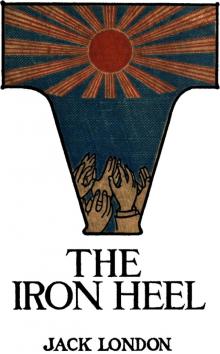 The Iron Heel
The Iron Heel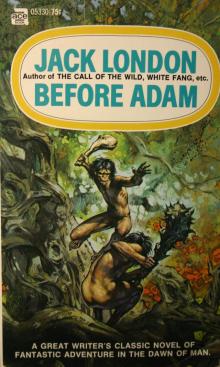 Before Adam
Before Adam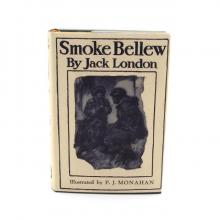 Smoke Bellew
Smoke Bellew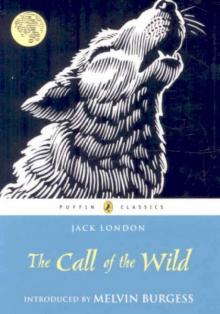 The Call of the Wild
The Call of the Wild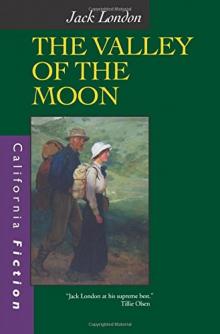 The Valley of the Moon Jack London
The Valley of the Moon Jack London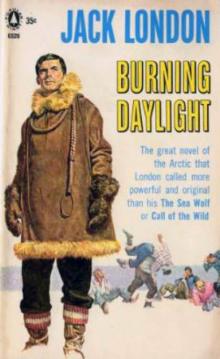 Burning Daylight
Burning Daylight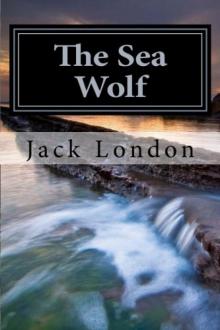 The Sea Wolf
The Sea Wolf White Fang
White Fang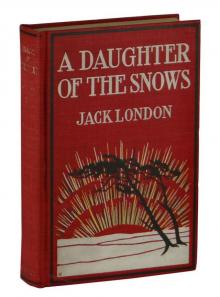 A Daughter of the Snows
A Daughter of the Snows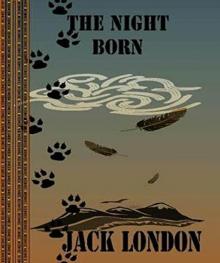 The Night-Born
The Night-Born A Son Of The Sun
A Son Of The Sun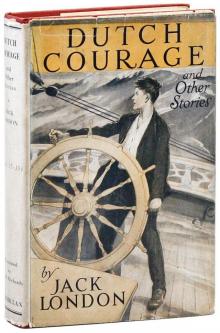 Dutch Courage and Other Stories
Dutch Courage and Other Stories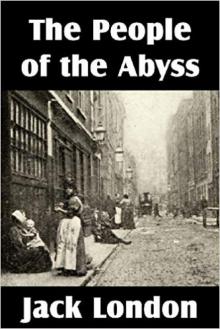 The People of the Abyss
The People of the Abyss Michael, Brother of Jerry
Michael, Brother of Jerry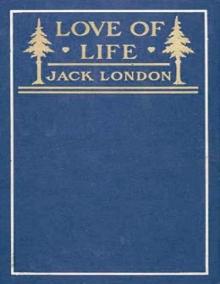 Love of Life, and Other Stories
Love of Life, and Other Stories Lost Face
Lost Face The Road
The Road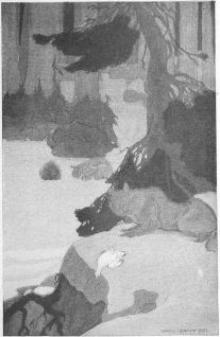 Love of Life
Love of Life The Turtles of Tasman
The Turtles of Tasman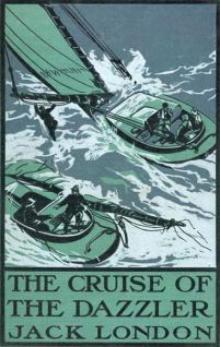 The Cruise of The Dazzler
The Cruise of The Dazzler The Heathen
The Heathen The Scab
The Scab The Faith of Men
The Faith of Men Adventure
Adventure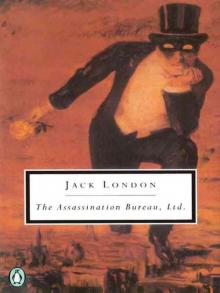 The Assassination Bureau, Ltd.
The Assassination Bureau, Ltd.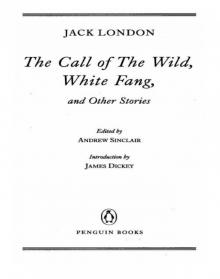 The Call of the Wild, White Fang, and Other Stories
The Call of the Wild, White Fang, and Other Stories The Call of the Wild and Selected Stories
The Call of the Wild and Selected Stories Jerry of the Islands
Jerry of the Islands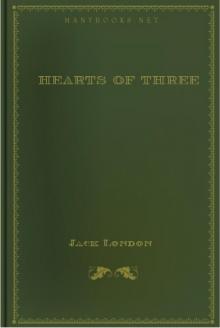 Hearts of Three
Hearts of Three The House of Pride
The House of Pride Moon-Face and Other Stories
Moon-Face and Other Stories Children of the Frost
Children of the Frost South Sea Tales
South Sea Tales The Strength of the Strong
The Strength of the Strong The Jacket (The Star-Rover)
The Jacket (The Star-Rover) The Little Lady of the Big House
The Little Lady of the Big House John Barleycorn
John Barleycorn ADaugter of Snows
ADaugter of Snows The Mutiny of the Elsinore
The Mutiny of the Elsinore Northland Stories
Northland Stories Tales of the Fish Patrol
Tales of the Fish Patrol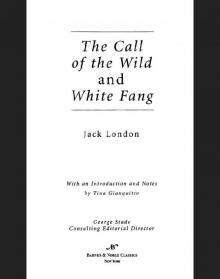 Call of the Wild and White Fang (Barnes & Noble Classics Series)
Call of the Wild and White Fang (Barnes & Noble Classics Series) The Valley of the Moon
The Valley of the Moon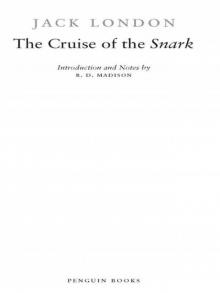 The Cruise of the Snark
The Cruise of the Snark The Game
The Game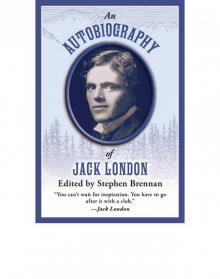 An Autobiography of Jack London
An Autobiography of Jack London